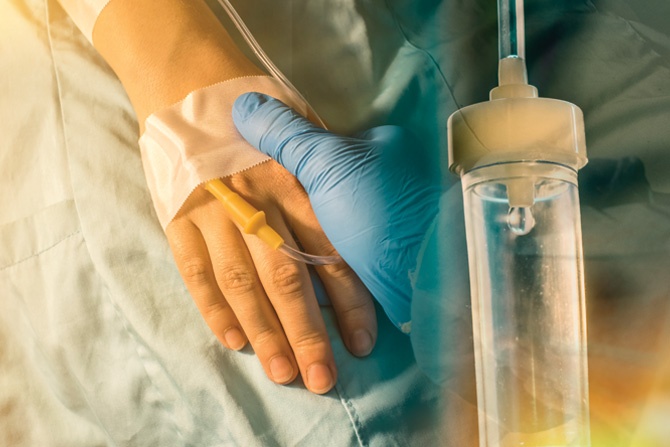In November 2020, the FDA granted emergency use authorization of monoclonal antibodies for the treatment of COVID-19. Studies have shown that these medications, if infused within the first seven days of symptoms in high-risk patients, can lower one’s risk of hospitalization. Despite potential benefits to both patients and hospitals, uptake across the nation has been rather slow due to challenges and barriers to connecting patients to these potentially lifesaving drugs.
Here in Utah, we have two sets of paired agents available: casirivimab-imdevimab (made by Regeneron) and bamlanivimab-etesevimab (made by Eli Lily). Currently, it is believed that there are no significant differences in risks or benefits between the two combo treatments. We have been fortunate to have more availability of these medications than some other states; however, many family docs still have a lot of uncertainty over which patients are eligible for treatment as well as over how to get patients treated within a patient’s treatment window.
Some frequently asked questions are listed below, but additional information may be found at the state website:
Coronavirus.utah.gov/noveltherapeutics
Q: Who is eligible for treatment?
A: In Utah, adult patients and teenagers 16 years or older in Utah must satisfy the following criteria:
- Testing: Patients must have a positive COVID test, either by NAAT (i.e PCR) or rapid antigen testing.
- Timing: Patients must be within the first seven days of symptoms. If a patient was asymptomatic when they tested, but they developed symptoms within a few days of testing, they may still be eligible.
- Risk Factors: Patients must score a minimum of six points or higher (i.e. greater than 5.5) on a COVID risk score calculator, based on health history and demographics. Conditions include diabetes, hypertension, CKD stage three or higher, among others. Prediabetes and sleep apnea are common conditions that frequently get mistaken as risk factors, but are not. Please see the state website for further details.
- Symptoms: Patients must be symptomatic, even if only mildly so. Completely asymptomatic patients who feel 100% at their baseline are not eligible for treatment. A sensation of shortness of breath from COVID also earns a patient an additional point on the risk score calculator.
- Home O2 use: Patients are only eligible if they do not have an increased O2 requirement over their pre-COVID baseline.
- Hospitalization: Patients are not eligible for MAbs if they are admitted, were admitted, or are being admitted for COVID-related care.
Pediatric patients under age 16 have separate criteria, including that they must have an underlying B cell immunodeficiency. Please see the state website for these criteria.
For adult or pediatric patients who do not qualify for treatment under the state criteria, physicians may apply for compassionate use criteria directly from Regeneron or Eli Lily.
Q: What does the medication cost?
A: Currently, the medication itself is available free of charge under an HHS program. However, there is still a charge for the administration of the medication since it is given as an IV infusion.
Q: Where can my patients get treated?
A: Contact information for healthcare systems offering monoclonal antibody programs can be found at the state website, Coronavirus.utah.gov/noveltherapeutics, under the tab “Where Can I Get It?” Patients with insurance should seek treatment within the healthcare system that is “in-network” for their insurance. Most private insurance companies in Utah have followed CMS’s lead in covering monoclonal antibodies for acute COVID-19 treatment; however, a handful have not. Patients should contact their insurers to check prior to being treated.
For patients without insurance, some of the health systems in Utah have created programs to help cover the cost of the infusion. For example, Intermountain Healthcare has a voucher program for self-pay patients unable to afford the cost of the infusion. Patients should enquire at the time of scheduling.
Thea Sakata, MD, is a family medicine-trained urgent care physician who was redeployed to the Intermountain COVID Monoclonal Antibody Team, aka “The Mab Squad.”








